43 Evidence-Based Benefits of Broccoli
What is Broccoli
Broccoli is an important part of a healthy diet for many people around the world, and while broccoli is widely appreciated for its unique taste and crunchiness, most people don’t even realize that this veggie prevents various types of cancer, improves eye health, and helps you shed the pounds.
Broccoli is a cruciferous vegetable and a rich source of vitamins, minerals, and other nutrients.
In fact, thanks to its nutritional value, broccoli can be called the queen of a healthy diet.
You’ve probably heard your friends brag about how great they feel after having eaten a piece of broccoli or how they managed to slim down having broccoli as part of their diet, and judging by the long list of health benefits broccoli offers, your friends have a point!
While broccoli has become somewhat of a food trend lately, many people regard it as a hyped-up health food that offers few benefits, but you’ll be surprised to find out all the health benefits that broccoli offers.
History
Broccoli’s history dates back to the times of ancient Rome when Romans grew broccoli from wild cabbage.
In fact, broccoli is related to cabbage, cauliflower, kale, and Brussels sprouts.
The name “broccoli” was derived from the Latin word “brachium,” which translates as “arm” and “branch.”
It should be noted that while Greeks and Romans ate broccoli over 2,000 years ago, this crunchy and nutritious vegetable didn’t appear in Europe until the sixteenth century.
In the ’20s of the twentieth century, broccoli was “colonized” by Italian migrants in the United States.
Today, broccoli is considered one of the most popular veggies in the U.S., the UK, Spain, and Italy.
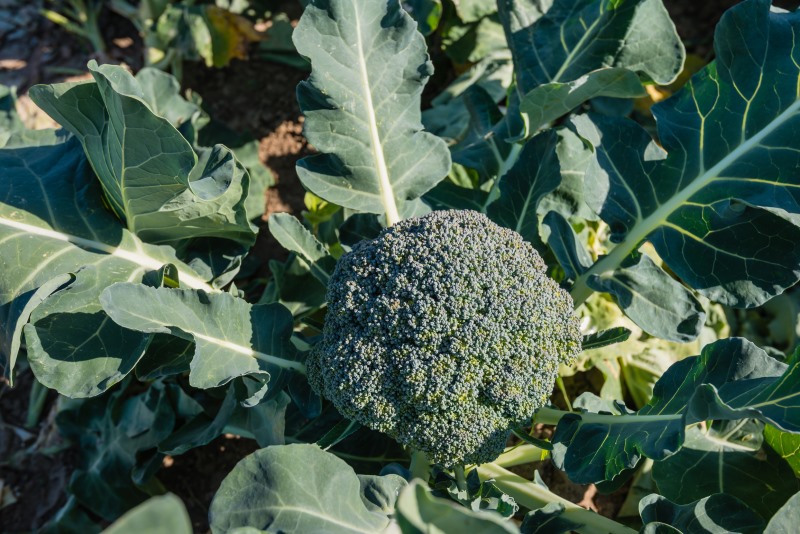
How Broccoli Grows
Summer harvest: You should plant broccoli seeds indoors six weeks before the last spring frost and transplant the seedlings that are about a month old to the garden.
If you prefer nursery beds, plant broccoli seeds directly into them, and then transplant the seedlings to the garden.
Fall harvest: You should plant broccoli seeds indoors twelve to fourteen weeks before the first fall frost, and transplant the seedlings when they are a month or a month and a half old.
Broccoli requires lots of nutrition and care, which is why it should only be planted in soil with a pH between 6.0 and 7.0.
It’s best to select sunny sites with well-drained soil to get the most out of broccoli plants.
Before planting your broccoli, loosen the soil by mixing at least an inch of mature compost.
If you’re certain your soil is highly fertile, mix in a high-nitrogen organic fertilizer.
Before you transplant the seedlings, water the planting bed and allow about nineteen inches between the plants.
Broccoli can be grown pretty much all around the world, but it’s best suited for a moderately continental climate with a temperature of about 73–77 degrees Fahrenheit and high humidity.
Interesting Facts
Broccoli has a higher content of vitamin A and vitamin C than all other types of cabbage (1, 2).
Even if you have broccoli in a covered bowl in the fridge, it cannot be stored for more than three days. Otherwise, it will lose almost half of its vitamin content.
Broccoli contains substances that prevent the development of cancer cells (3, 4).
Broccoli appeared in the United Kingdom in the eighteenth century and was called “Italian asparagus.”
In the United States, production of broccoli began in the middle ’20s of the twentieth century (at the end of the eighteenth century, Thomas Jefferson tried to grow broccoli, but it didn’t spread around the country) (5).
China grows the most broccoli in the world — up to ten million tons annually (6).
When broccoli’s flower buds become bright yellow, it has a very bitter taste.
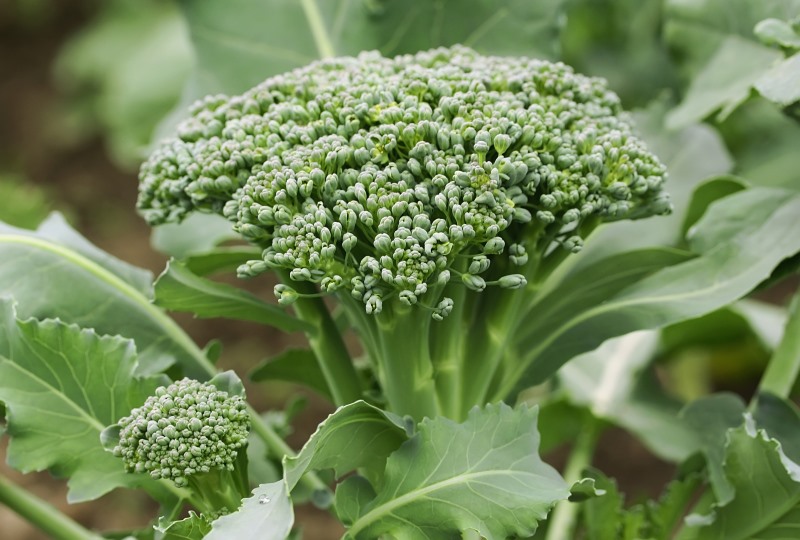
Nutritional Facts
Broccoli is low in calories, with only thirty-four kcal per one hundred grams.
By contrast, one medium-size apple contains seventy-two kcal.
In fact, one hundred grams of boiled broccoli has even fewer calories than raw broccoli — twenty-seven kcal.
One hundred grams of broccoli has three grams of protein, which is pretty good for a vegetable.
In fact, the structure of broccoli’s protein is similar to that of animal protein (35, 36).
Moreover, consuming broccoli won’t contaminate your body with cholesterol as much as meat does.
One hundred grams of broccoli contains seven grams of carbs, including only 1.3 grams of sugar and a whopping 2.6 grams of fiber.
The rest of broccoli’s carbs are complex carbohydrates, which don’t spike insulin levels and provide the body with energy for long periods of time.
Eating broccoli one to two hours before a workout would be a great idea if you want to keep your energy levels in check.
Broccoli has a glycemic index of 10, which makes it a perfect product to promote weight loss and get rid of cellulite (43).
You can easily lose all its health benefits, however, if you don’t store this veggie properly.
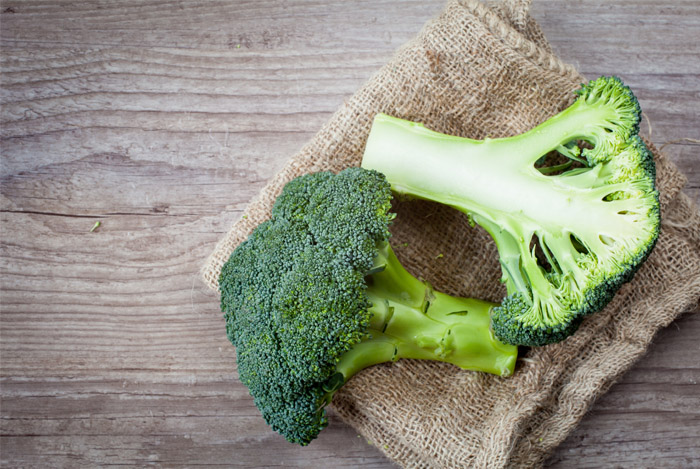
Health Benefits of Broccoli
Broccoli’s health benefits can be explained by the vegetable’s rich vitamin, nutrient, mineral, and compound content.
Regarding vitamins, broccoli outperforms a great number of other vegetables.
If you want to get as many vitamins as possible on your dinner table, cook something with broccoli.
Apart from its rich amount of vitamins and minerals, you should include broccoli in your everyday diet thanks to its high content of antioxidants and plant compounds, some of which promote good heart health and even prevent cancer.
Broccoli has a number of science-proven health benefits, including cancer prevention, lowering cholesterol levels, improving eye and gut health, and many others.
Instead of buying medication to fight various disease, isn’t it better to eat broccoli every day?
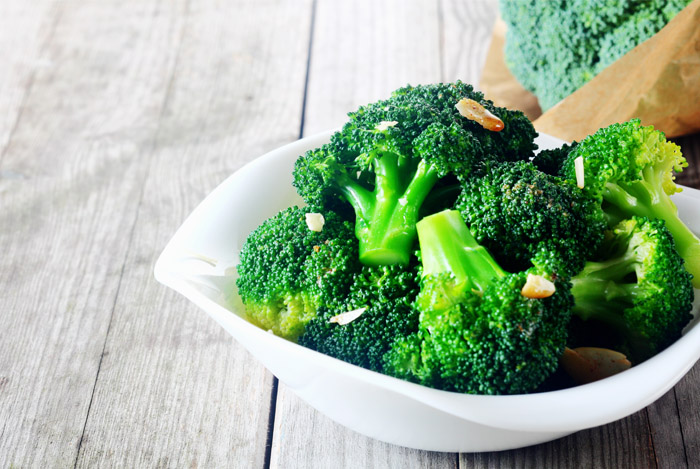
Rich in Fiber
Broccoli is a rich source of fiber, which cleanses the body of toxins, bad cholesterol, and dead cells (7).
In fact, by including broccoli in your everyday diet, you can eliminate excess cholesterol from your body, and its high fiber content promotes weight loss (8, 9).
Contains Amino Acids
Broccoli is also rich in amino acids, which are so essential for your health.
For example, it contains tryptophan, the amino acid from which serotonin (the “happiness hormone”) is made (10).
Calcium-rich Vegetable
One hundred grams of broccoli contains about fifty mg of calcium, which is the same amount of calcium as in forty ml of milk.
Calcium is an essential mineral, which makes up about 1%–2% of a human’s body weight.
Calcium is also important for bone structure as well as regulating muscle and nerve function (11).
Instead of getting calcium from dairy products, you can eat broccoli.
In fact, broccoli would be a perfect source of calcium if you are lactose intolerant.
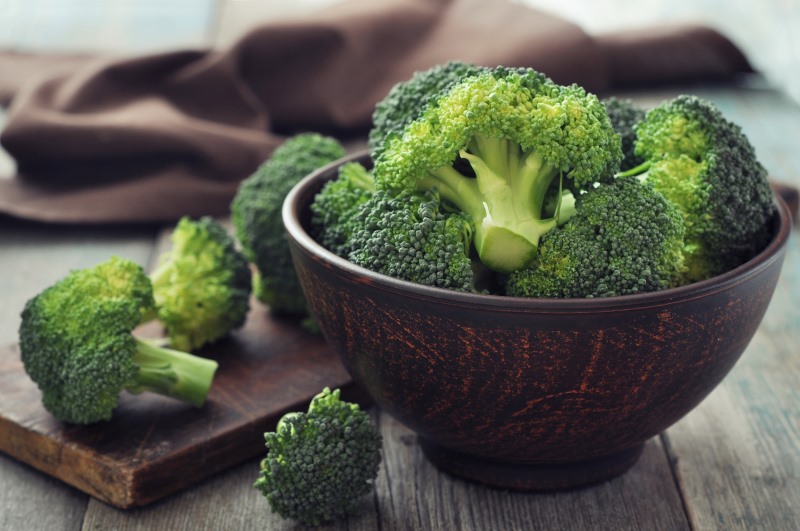
Rich in Potassium
One hundred grams of broccoli contains 316 mg of potassium, which is so essential for the normal functioning of the human body.
If you want to keep your blood pressure in check and prevent cardiovascular disease, try to eat this vegetable every day (12).
Potassium found in broccoli is essential for the transmission of nerve impulses, which means your brain wouldn’t be able to function properly without getting the recommended daily amount of potassium (13).
If you’re an athlete or a bodybuilder, including broccoli in your everyday diet would be one of your best dieting choices.
First of all, potassium is linked to weight reduction; second, it’s essential for muscle contraction, and it also promotes normal heart function (8, 14).
Rich Source of Sodium
Since potassium comes with sodium and chlorine in broccoli, it guarantees the transportation of nutrients to the cells (15).
You’ve probably heard that a large portion of sodium comes from salt, but it’s essential for this nutrient to come from vegetables as well, as it promotes normal liver and heart function (16).
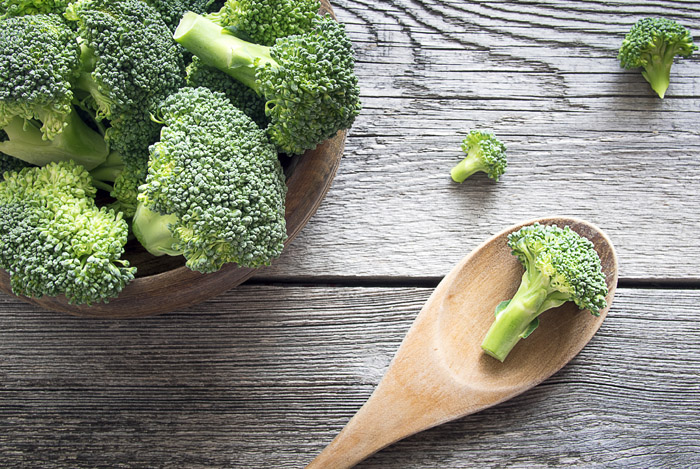
High in Magnesium
This crunchy vegetable is also high in magnesium, which is an irreplaceable trace element for normal functioning of the brain.
One hundred grams of broccoli contains twenty-one mg of magnesium (18).
Great Source of Phosphorus
Phosphorus, which is critical for regulating bone structure in the human body, is also found in broccoli (19).
Contains Beta-Carotene
Beta-carotene is great for keeping your skin glowing: not only does vitamin A keep your skin moisturized from the inside, but it also regulates the function of your sebaceous gland (20).
Vitamin A also provides your body with antioxidant protection, promotes rejuvenation of the cells, and improves eye health (21).
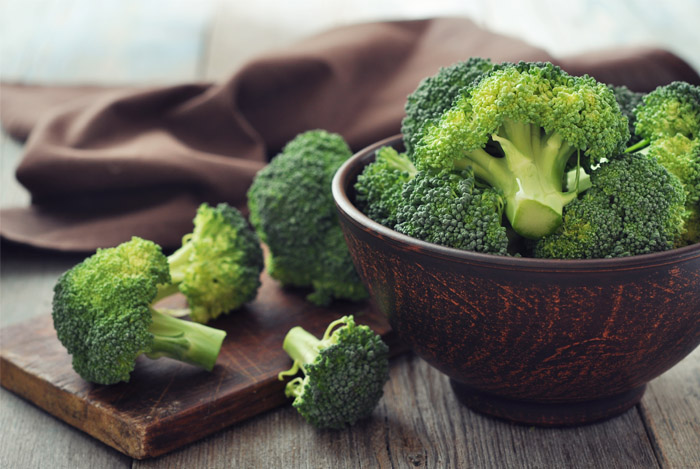
Dietary Source of Vitamin B1
Vitamin B1 (thiamine) is essential for adenosine triphosphate synthesis as well as a reduplication of DNA and RNA molecules.
One hundred grams of broccoli contains 0.07 mg of vitamin B1 (22).
Rich in Vitamin B2
Vitamin B2 (riboflavin) is an essential antioxidant vitamin, which fights free radicals in the human body.
It’s also essential for the development of red blood cells. One hundred grams of broccoli contains 0.12 mg of vitamin B2 (23).
Contains Vitamin B6
Broccoli is also rich in vitamin B6 (0.18 mg in one hundred grams of broccoli), which is important in the production of antibodies and is an essential vitamin for normal functioning of the immune system (24).
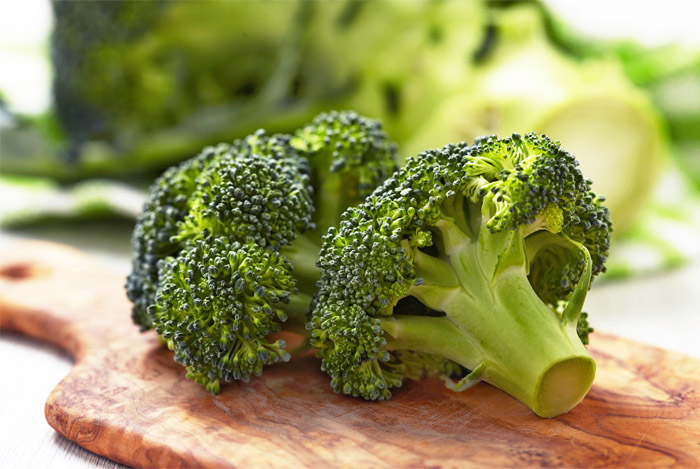
Unique Source of Vitamin B9
Broccoli is best known for its high content of vitamin B9 (folate), which is a crucial element for pregnant women, as it promotes normal development of the offspring’s nervous system (25).
If you’re pregnant and wondering whether or not it’s safe to include broccoli in your everyday diet, the answer is Yes!
It’s safe and highly recommended!
Folate also stimulates normal tissue growth and regulates cell function (26).
Contains Vitamin C
The most surprising feature of broccoli is that it has more vitamin C than citrus fruits!
Exactly one hundred grams of broccoli covers 100% of the daily value of vitamin C, which is so necessary for boosting the immune system and improving skin health (27).
More Vitamin E than in Olive Oil
Broccoli is also high in vitamin E, which is important for heart health as well as protecting cellular membranes from breaking down.
One hundred grams of broccoli (0.78 mg) contains more vitamin E than a teaspoon of olive oil (0.65 mg) (28).
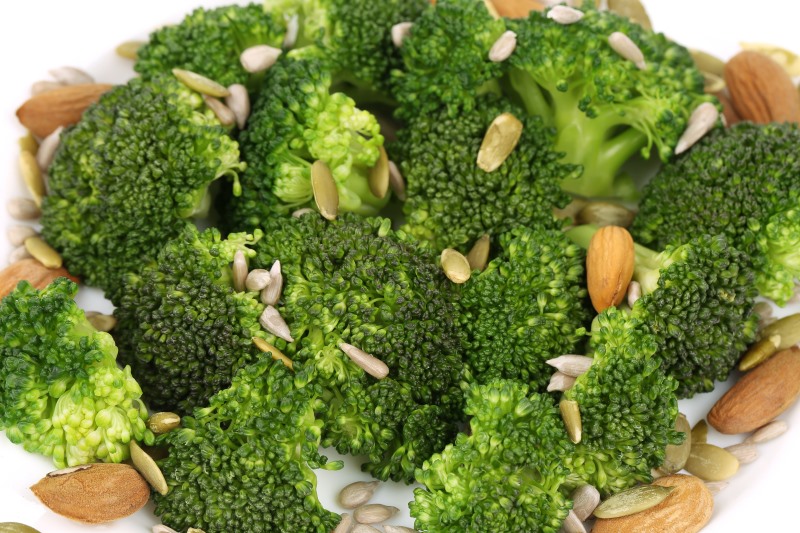
Rich in Vitamin K1
Broccoli is also rich in vitamin K1, which is crucial for bone health as well as blood clotting.
One hundred grams of broccoli contains 85% of the daily recommended intake of this vitamin (29).
Rich in Cancer-Fighting Sulforaphane
Broccoli’s cancer-preventing properties can be attributed to sulforaphane, which has been very thoroughly studied over the years.
This plant compound protects the human body from various types of cancer (30, 3).
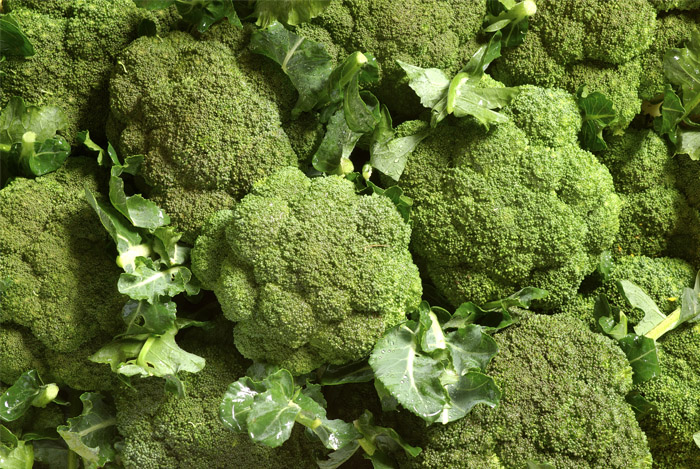
High in Indole-3-carbinol
Indole-3-carbinol, which is found in broccoli and other cruciferous vegetables, is also believed to protect against cancer (31).
Source of Carotenoids
If you’re looking to improve your eye health, don’t limit yourself to carrots only; include broccoli in your diet as well!
Thanks to its high content of such carotenoids as lutein, zeaxanthin, and beta-carotene, eating broccoli helps improve eyesight (32).
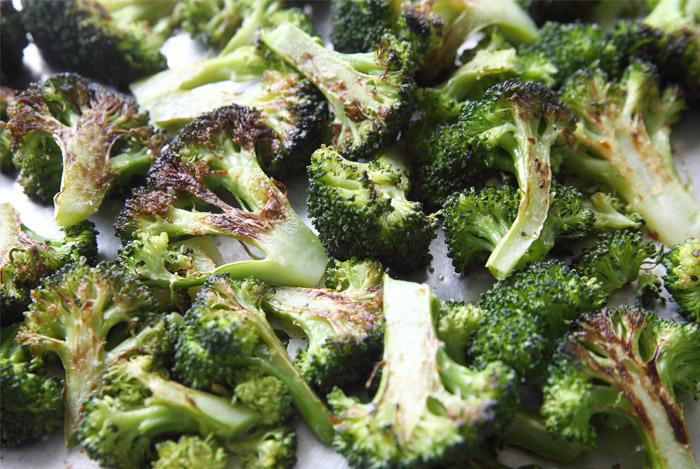
Rich in Kaempferol
Kaempferol is a do-everything plant compound that protects against cancer, reduces inflammation in the body, promotes good heart health, and fights allergies (33).
Best Sources of Quercetin
If you’re suffering from high blood pressure, eat broccoli! This vegetable lowers blood pressure, thanks to its high amount of quercetin (34).
Extremely Low in Calories
Broccoli is low in calories — only thirty-four kcal per one hundred grams.
By contrast, one medium apple contains seventy-two kcal.
In fact, one hundred grams of boiled broccoli has even fewer calories than raw broccoli — twenty-seven kcal.
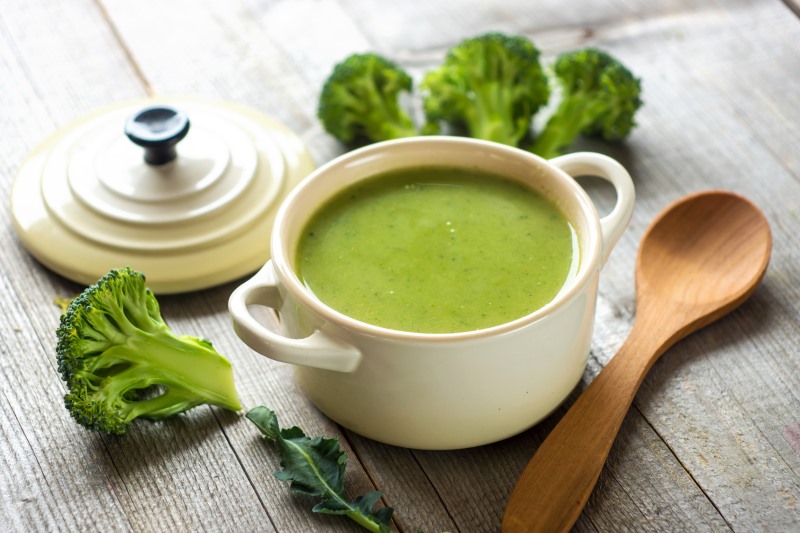
Broccoli’s Protein Content Can Compete with Meat
One hundred grams of broccoli has three grams of protein, which is pretty good for a vegetable.
In fact, the structure of broccoli’s protein reminds one of animal protein (35, 36).
Consuming broccoli won’t contaminate your body with cholesterol as much as meat does.
Source of Complex Carbs
One hundred grams of broccoli contains seven grams of carbs, including only 1.3 grams of sugar and 2.6 grams of fiber.
Broccoli’s other carbs are complex carbohydrates, which don’t spike insulin levels and provide the body with energy for long periods of time.
Eating broccoli one to two hours before a workout would be a great idea if you want to keep your energy levels in check.
Contains No Fat
Broccoli has no fat whatsoever, which is why it’s recommended for people who want to lose weight (9).
Reduces Harmful Effects of Sugar
If you treat yourself to sweets every once in a while, eating broccoli is essential to reduce the harmful effects of sugar.
Sugar gradually destroys blood vessels, which may result in atherosclerotic plaques (39, 40).
Thanks to its high content of vitamins, minerals, and other plant compounds, broccoli protects the vessels from this and other harmful effects of sugar.
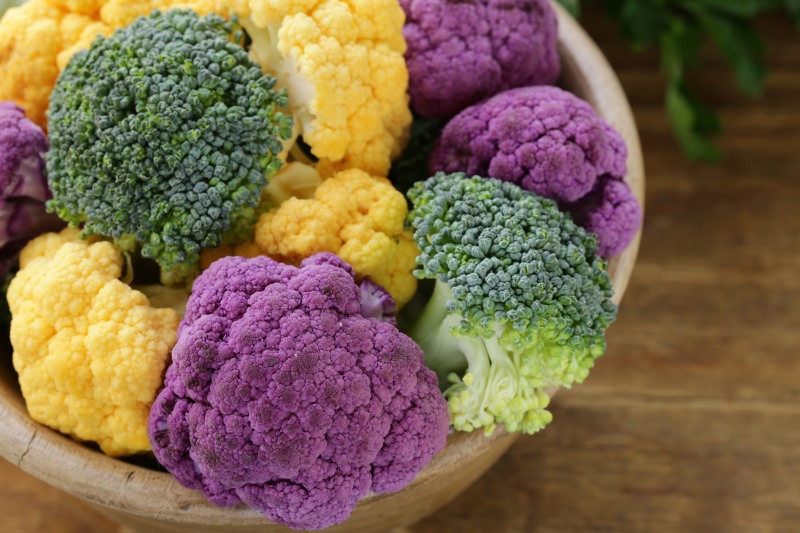
Positive Effect on Nervous System
Physiologically active substances found in broccoli positively affect the nervous system and heart health.
If you’re suffering from heart disease, it’s recommended that you eat broccoli every day (41, 42).
Prevents Cancer
Broccoli is one dietary source that prevents and treats various types of cancer, including breast cancer, prostate cancer, and skin cancer.
This anticancer effect is provided by its large amount of sulforaphane (3, 44).
Sulforaphane prevents the development of cancer cells, and most of it can be found in the stems of baby broccoli.
The cabbage head of broccoli has about ten times less sulforaphane than its stems (45).
It should be noted that heating reduces the anticancer effects of sulforaphane as well as the health benefits of broccoli as a whole.
Apart from sulforaphane, two other substances also prevent cancer.
Sinigrin, which can be found not only in broccoli but also in other types of cabbage, destroys cancer cells (46).
Indole-3-carbinol, which not only destroys cancer cells but also boosts the immune system, can fight off cancerous tumors (47, 48).
Folate, which broccoli has in abundance, is recommended for breast cancer prevention.
This substance is recommended for pregnant women because it promotes the rapid development of new cells (49).
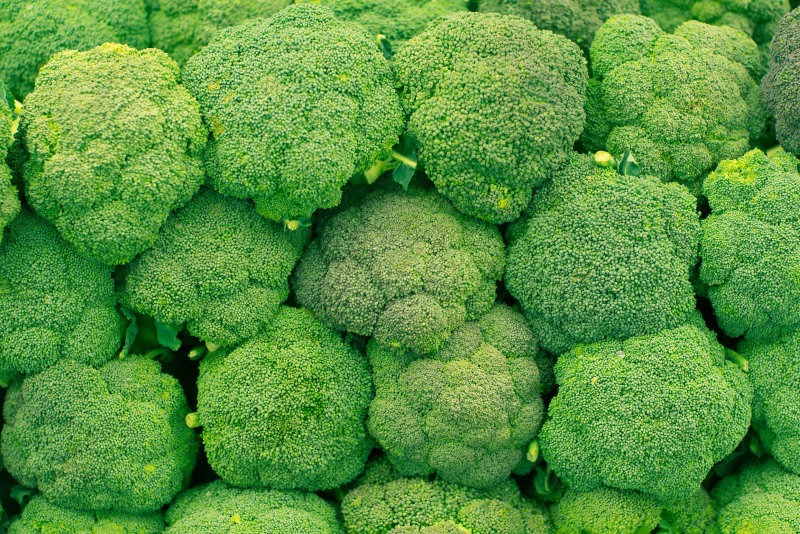
Lowers Cholesterol Levels
Cholesterol is an essential element for the proper functioning of the human body.
It synthesizes bile acids, which are secreted in the bile.
Bile acids are important for your body because they absorb fat from the contents of the intestine, but more than 90% of bile acids are reabsorbed into the bloodstream and used again.
This means that the liver has to synthesize between 1,500 and 2,000 mg of new cholesterol each day, and it mostly synthesizes cholesterol from the products of fat metabolism (50).
Broccoli can increase the elimination of bile acids from the body and prevent them from being reabsorbed again (51).
If you eat broccoli, substances in this vegetable synthesize new bile acids from cholesterol, which lowers the overall level of cholesterol in your body.
As a result, by reducing the total level of cholesterol in the body you reduce the risk of heart disease and cancer.
You have to eat steamed broccoli, which is the most efficient way to lower cholesterol levels (52).
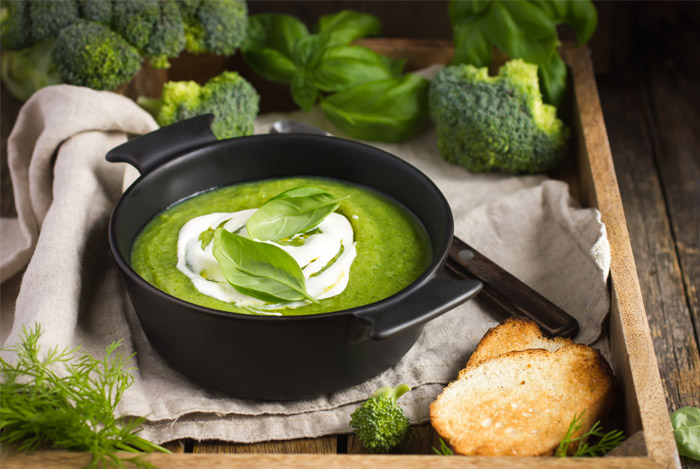
Improves Eye Health
It’s no secret that eyesight gets worse with age, but some substances help decrease the risk of age-related impaired eyesight.
Broccoli contains in particular lutein and zeaxanthin, two carotenoids that have been linked to preventing eye disorders (53, 54).
If you don’t consume enough vitamin A, you may even develop night blindness, conjunctival xerosis, and many other eye disorders (55, 56).
To prevent the development of eye disorders, it is recommended to eat foods rich in beta-carotene.
Broccoli is rich in beta-carotene, which is converted into vitamin A in the body.
But it’s not only vitamin A that has this beneficial effect for the eyes, as broccoli also contains phosphorus, B vitamins, and vitamins C and E, all of which have been proven to have a positive impact on eyesight.
Not only do these substances protect the eyes from macular degeneration and cataracts, but they also help you to recover from damage caused by UV radiation (57, 58).
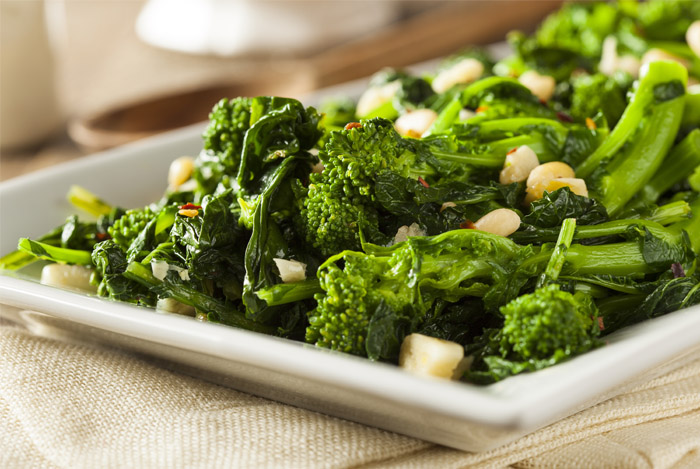
Treats Diabetes
Due to broccoli’s low sugar content, this vegetable is highly recommended for people suffering from diabetes (37).
By including broccoli in your everyday diet, you can reverse the damage that diabetes does to your heart’s blood vessels (38).
People suffering from diabetes are up to five times more likely to develop heart disease (84).
Potent Detoxifier
The fact that broccoli contains vitamin C, vitamin B2 and a few amino acids makes it a very potent detoxifier.
By consuming broccoli regularly, you remove free radicals and toxins from the body, purify the blood, and prevent such unpleasant disorders as rashes, eczema, abscesses, itchiness, arthritis, and kidney problems (59).
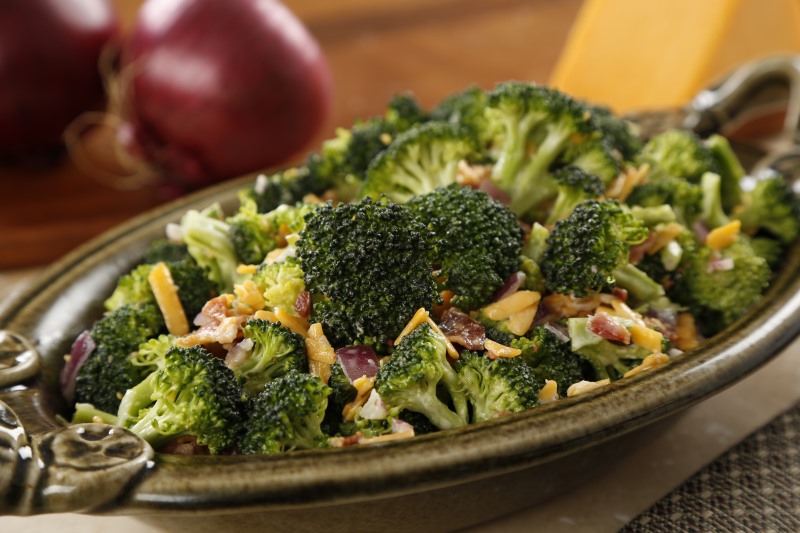
Treats Gut Disorders
Broccoli is rich in fiber, which helps treat various gut disorders because it prevents constipation, the main cause of many gut disorders.
Including broccoli in your diet is a must if you have trouble with your digestive tract.
Magnesium and vitamins contained in broccoli maintain proper acidity in the body, promote digestion, help absorb nutrients from dietary sources more efficiently, and calm the stomach by reducing inflammation (60, 61).
Improves Your Skin
Such antioxidants as beta-carotene, vitamin C, vitamin B group, vitamins E, A, and K, as well as amino acids and folate, all of which can be found in broccoli, can keep your skin fresh and young (62, 63).
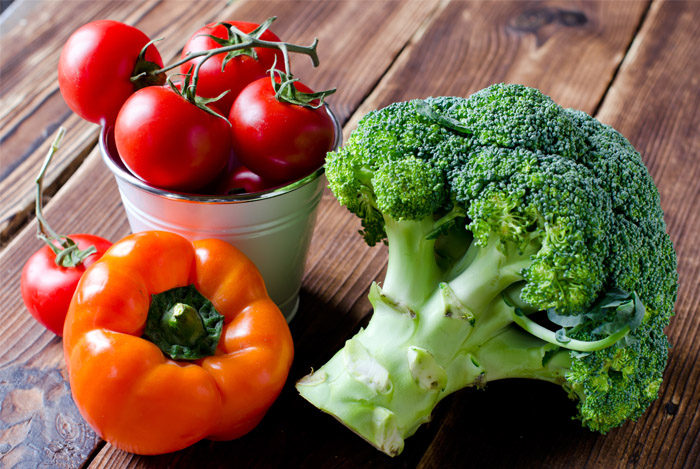
Prevents Heart Disease
Broccoli is rich in fiber, beta-carotene, and other vitamins that help decrease the levels of bad cholesterol as well as maintain the heart’s proper function by regulating blood pressure (64, 65).
Boosts Immune System
The substances responsible for the purplish and green colors of broccoli, vitamin C, beta-carotene, and other vitamins and minerals (in particular, zinc, phosphorus, and copper) boost the immune system and help fight off various types of infections (66, 67, 68).
The next time you think drinking hot tea with lemon is the only countermeasure to prevent colds in the winter, think again!
Eating broccoli regularly will do the job as well!
Good for Bone Health
Broccoli is particularly beneficial for children, elderly people, pregnant women, and breast-feeding mothers because they are most prone to marble bone disease, the fragility of bones and teeth, and calcium deficiency.
Broccoli has calcium, magnesium, zinc, and phosphorus in abundance, all of which have positive effects on the bones (69).
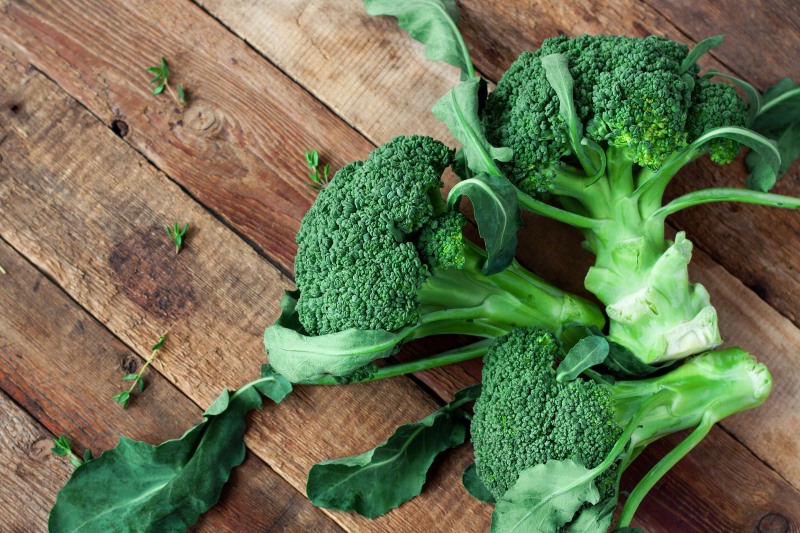
Great for Pregnant Women
Thanks to broccoli being rich in the nutrients so essential for pregnant women — proteins, calcium, phosphorus, folate, vitamins, antioxidants, detoxifiers, zinc, and other nutrients — it is a great addition to the diet of pregnant women (70, 71, 72).
Broccoli also improves the state of tissues in the body, which results in less cellulite, reduces the risk of inflammatory processes and tumors in women’s reproductive organs, and promotes normal growth of offspring (75).
Regulates Blood Pressure
Chromium, which can be found in broccoli, helps insulin to function properly and regulates sugar levels in the blood, both of which result in normalization of blood pressure (73).
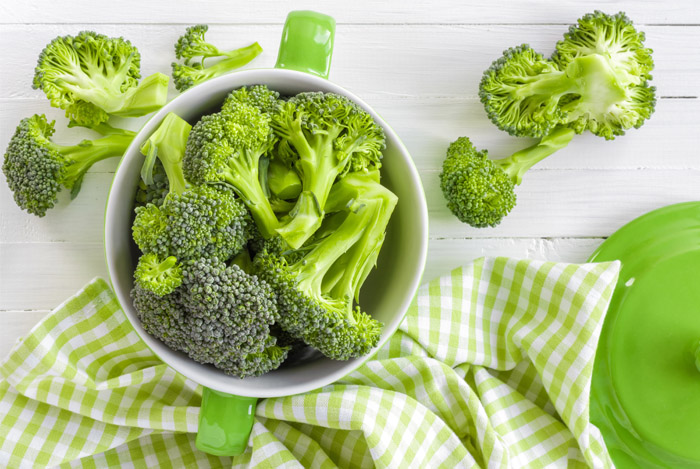
Broccoli Treats Anemia
Anemia is directly caused by iron deficiency and the lack of protein in the body.
Thanks to its rich content of iron, broccoli is helpful in treating anemia (74).
Iron is a highly essential mineral, especially during times of rapid growth and development, which means that pregnant women and children require even more iron in their diet.
Promotes Weight Loss
Women are confident that broccoli helps them maintain their beauty and can be safely introduced into their weight loss diets.
Since it’s low in calories and has a high fiber content, broccoli is one of the few products that not only does not make you fat but also helps you lose weight.
Broccoli is low in calories, but its fiber content also guarantees that you will feel full for a long time.
Broccoli would be a great addition to the diet of overweight people.
Increases Sex Stamina in Men
Apart from its general health benefits, broccoli is also good for men’s health.
Broccoli prevents prostate cancer and prostate gland cancer.
It is used as a natural aphrodisiac agent and also increases bone strength and reduces the recovery time needed after injuries (76, 77, 78).
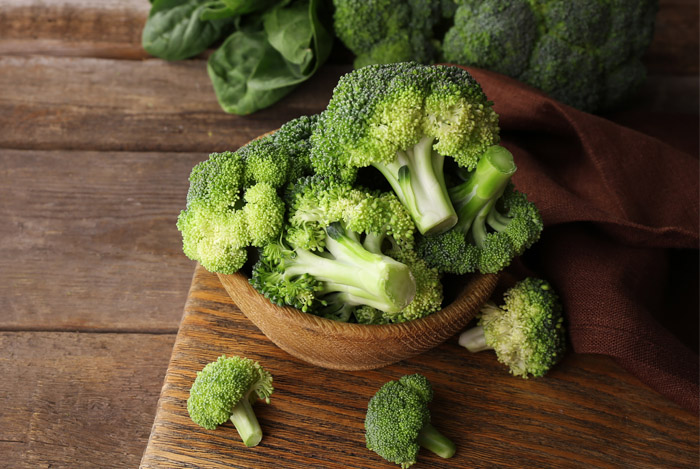
Safe Food for Children
Broccoli is also great for children’s health, since it’s a hypoallergenic product.
You can feed your children broccoli and not be afraid of allergies (79).
If you’re looking for dietary sources that would provide balanced nutrition for your child, add broccoli to that list, since it provides a pretty good percentage of the daily recommended intake of many vitamins and minerals.
Thanks to its high content of protein, broccoli is good for children who don’t like the taste of meat.
If you’re breast-feeding your child, you can introduce broccoli into his/her diet in the form of vegetable mash from the seventh month.
From the eighth month on, you can feed your child broccoli soup.
When your child has enough teeth and can chew properly, you can add broccoli to salads.
Helps You Look Younger
Broccoli is a great source of vitamin C, which means if you consume broccoli regularly you reduce wrinkles and improve your overall skin complexion.
Vitamin C is known to fight skin damage caused by the sun, pollution, and aging (82).
Vitamin C also contributes greatly to the formation of collagen, which is the most essential support system of your skin (83).
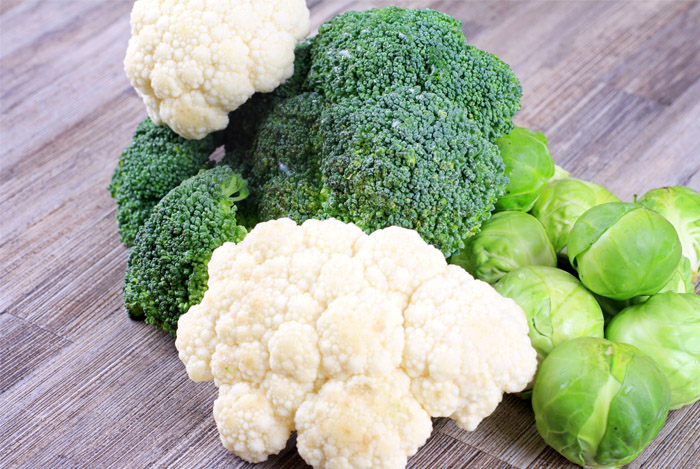
How to Buy and Store
You can buy broccoli at grocery stores year-round, but buying it in late summer and early fall is the best choice in terms of its nutritional value.
When choosing broccoli, select ones with green leaves and flower heads and thin stems.
If the stem is too thick, it means the broccoli is overripe.
Flower heads must be small, tightly covered, and green.
Don’t buy broccoli with yellowish heads, as this means that the vegetable has been improperly stored at the grocery store.
It’s best to cook broccoli immediately, since it loses its health benefits if stored for more than three days.
To store it properly and reduce the loss of health benefits, cover broccoli with wet paper towels and put it into the fridge.
DON’T store fresh broccoli in airtight bags or containers, as it needs air circulation.
A perforated plastic bag would be more suitable.
Even if you put broccoli into a covered bowl in the fridge, it cannot be stored for more than three days.
You can also buy frozen broccoli and store it in a freezer.
To properly store broccoli in a freezer, cut it into small pieces.
Then precook them in boiling water for five minutes.
Immediately put broccoli into ice-cold water, dry it off, and put it into containers with lids.
Frozen broccoli shouldn’t be stored for more than twelve months.
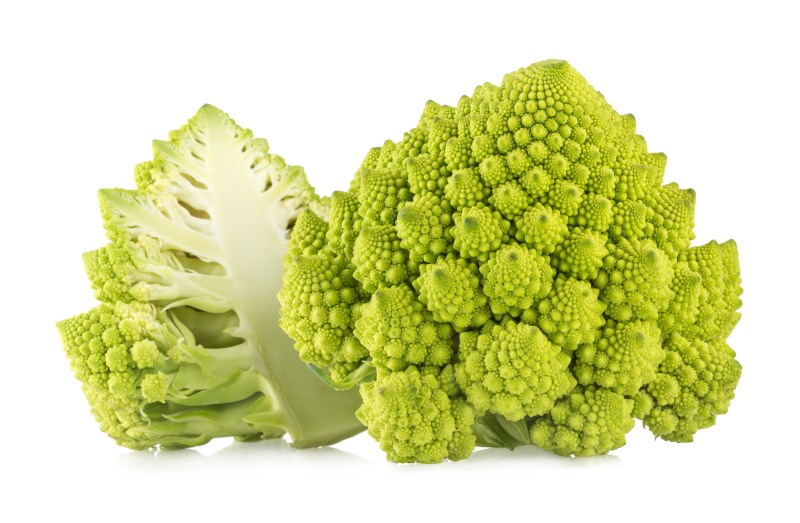
How to Incorporate More Broccoli Into Your Diet
Simply adding broccoli to your regular salads is certainly beneficial.
Raw broccoli gives your salads a tasty crunch and gives you the feeling of fullness for a long period of time.
If you’re a smoothie lover, adding broccoli would be another effective way to incorporate more broccoli into your diet.
Broccoli would also serve as a great addition to your protein shake before a workout, since it provides the body with energy.
You can also add broccoli to your soups.
Since broccoli is high in antioxidants that boost the immune system, it will make your soups effective against cold and flu.
Bake with broccoli. Every time you bake fish or meat in the oven, add broccoli to it for a delicious taste.
Whether it’s fish or meat, broccoli is also good with carrots and tomatoes.
Summer has come, so it’s time to start grilling outside, and broccoli is a vegetable you can grill.
When you grill broccoli with meat, you have a one-of-a-kind taste.
Have broccoli raw as a snack.
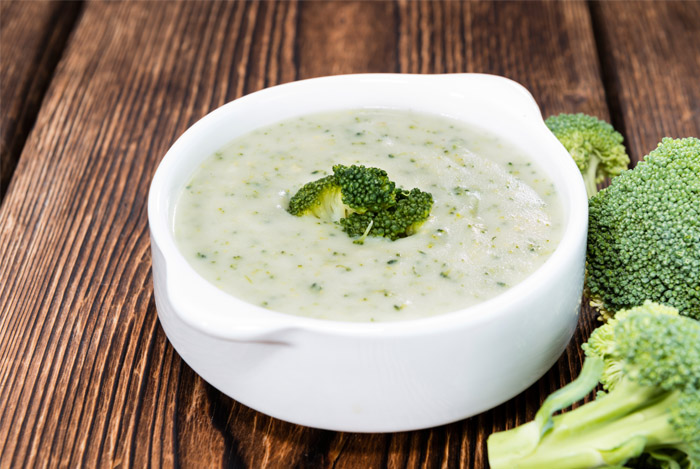
Couple Simple Recipes
Peppery broccoli
Ingredients
- Broccoli – 1
- Olive oil – 1 tbsp
- Water – ¼ cup
- Garlic – 1 minced clove
- Red pepper, salt, and ground black pepper – ½ tsp
Directions
- Trim the broccoli’s stem, and cut the broccoli into long pieces.
- Add olive oil, water, salt, garlic, and red and ground pepper to a large saucepan.
- Put the saucepan at high heat and bring it to a boil.
- Add the sliced broccoli, and cover the saucepan.
- Turn off the heat after 3 minutes of steaming, and let it sit there for a few more minutes without heat.
Creamy broccoli salad
Ingredients
- Feta cheese – ⅓ cup
- Nonfat yogurt – ½ cup
- Freshly squeezed lemon juice – 1 tbsp
- Garlic – 1 minced clove
- Ground pepper – ¼ tsp
- Broccoli crowns – 3 cups
- Chickpeas – 2 cups
- Red bed pepper – ½ cup sliced into tiny pieces
Directions
- Trim and chop the broccoli crowns.
- Mix together feta cheese, yogurt, garlic, lemon juice, and pepper in a bowl.
- Add broccoli, chickpeas, and bell pepper.
Veggie pizza
Ingredients
- Whole-wheat pizza dough – 1 pound
- Broccoli florets – 2 cups, chopped
- Arugula – 6 cups, chopped
- Water – ¼ cup
- Pesto – ½ cup
- Mozzarella cheese – 1 cup, chopped
- Salt and ground pepper to taste
Directions
- Preheat the oven to 450°F.
- Apply cooking spray to a large baking sheet.
- Start rolling out dough on a surfaced covered with flour.
- Place the dough on the baking sheet.
- Bake the dough until puffed and crisped on the bottom (about 10 minutes).
- Mix broccoli and water in a skillet and cook it at medium heat for about 3 minutes.
- Now add arugula and cook and stir for 2 more minutes.
- Add salt and pepper to taste.
- Spread pesto over the dough, add the broccoli mix and then add the cheese.
- Bake for another 10 minutes until the cheese melts.
Broccoli salad with bacon
Ingredients
- Garlic – 1 minced clove
- Low-fat mayo – ⅓ cup
- Low-fat sour cream – ¼ cup
- Vinegar – 2 tsp
- Sugar – ½ tsp
- Broccoli crowns – 4 cups, chopped
- Walnuts – 2 cups, chopped
- Cooked bacon – 3 slices finely chopped
- Dried cranberries – 3 tbsp
- Salt and ground pepper to taste
Directions
- Mix together garlic, sugar, mayo, sour cream, and vinegar in a large bowl.
- Add broccoli crowns, walnuts, bacon, dried cranberries, and pepper.
- Stir it up.
Roasted broccoli and tomatoes mix
Ingredients
- Broccoli crowns – 4 cups, finely chopped
- Grape tomatoes – 1 cup
- Olive oil – 1 tbsp
- Garlic – 1 minced clove
- Freshly squeezed lemon juice – 1 tbsp
- Salt – ¼ tsp
- Pitted black olives – 10, chopped
- Dried oregano – 1 tsp
Directions
- Preheat the oven to 450°F.
- Mix broccoli, tomatoes, olive oil, and garlic until combined.
- Spread the mixture in an even layer on a large baking sheet.
- Bake for 10–15 minutes until you see the broccoli turn brownish.
- Take a separate large bowl, mix lemon juice, olives, oregano, and salt.
- Add the vegetables from the oven to the bowl.
- Stir it up.
Broccoli-potato mash
Ingredients
- Potatoes – 1 pound, chopped
- Broccoli crowns – 4 cups, chopped
- Mozzarella cheese – ¾ cup, chopped
- Nonfat milk – ½ cup, heated
- Salt and ground pepper – ½ tsp
Directions
- Boil water in a large pot.
- Put potatoes into a steamer basket and steam for about 10 minutes.
- Now add broccoli to potatoes and steam for another 8 minutes.
- Take out the broccoli, and put it into a large bowl. Mash with a potato masher.
- Now add potatoes, cheese, milk, salt, and pepper and continue mashing until smooth.
Broccoli and creamy sauce
Ingredients
- Broccoli – 1 pound
- Flour – 1 tbsp
- Nonfat milk – 1 cup
- Parmesan cheese – ½ cup, grated
- Pinch of salt and ground pepper
Directions
- Trim off tough layers of broccoli using a vegetable peeler. Cut it lengthwise so that florets are between 1 and 2 inches wide.
- Boil water in a large pot.
- Put the broccoli into a steamer basket and steam for 5–7 minutes.
- Mix together flour and a ¼ cup of milk in a small bowl until smooth.
- Put the remaining ¾ cup of milk into a saucepan and heat at medium heat.
- Add the flour mixture, and cook for 2–4 minutes until thick.
- Turn off the heat, add cheese, salt, and pepper. Sprinkle with broccoli.
Broccoli-cheese pie
- Dry breadcrumbs – 2 tbsp
- Eggs – 4
- Nonfat milk – ¼ cup
- Hot sauce – ½ tsp
- Salt and ground pepper to taste
- Whole-grain bread – 2 slices without crusts
- Broccoli florets – 3 cups
- Olive oil – 2 tsp
- Bacon – 4 slices, diced
- Onion – chopped
- Mozzarella cheese – 1 cup, grated
Directions
- Preheat the oven to 350°F.
- Apply cooking spray to a deep-dish pie pan.
- Add breadcrumbs, coating bottom and sides as well.
- Mix together eggs, milk, hot sauce, salt, and pepper in a large bowl.
- Add bread and put the mixture into a fridge.
- Put the broccoli into a steamer basket and steam for 3–4 minutes.
- Put the steamed broccoli under cold water and drain well.
- Chop the broccoli finely.
- Heat olive oil on a nonstick skillet at medium heat.
- Put bacon and onion into the skillet and stir it up until golden and soft (about 5 minutes).
- Mix the broccoli, onion, and egg mixture together and add cheese.
- Now pour the combined mixture into the pan and let it spread evenly.
- Bake the mixture until lightly golden for about 50 minutes.
- Let it cool before serving.
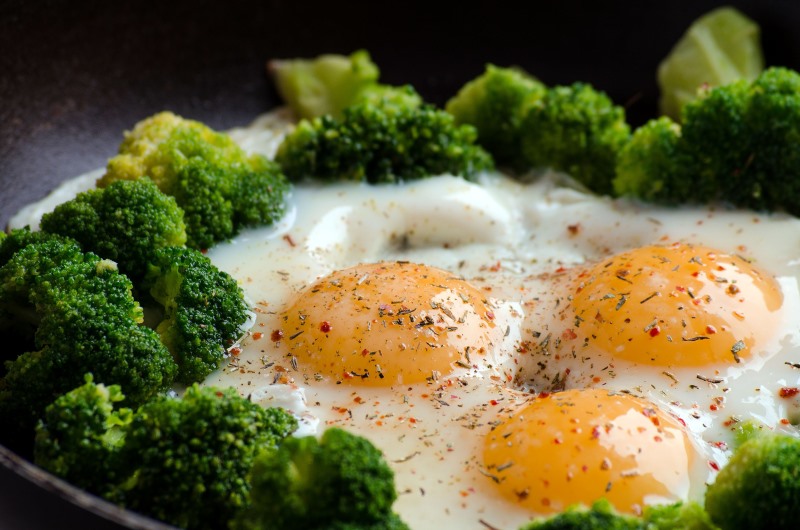
Precautions
You shouldn’t eat broccoli if you’re allergic to it, but very few people are allergic to this vegetable.
It’s not recommended to overeat broccoli, as you will be doing more harm than good.
Just like any other vegetable with high fiber content, broccoli may upset your stomach.
Studies suggest that cruciferous vegetables impair the function of the thyroid gland, which is why it’s recommended for people with low levels of thyroid hormones to limit their intake of broccoli (80).
Don’t eat broccoli broth, as it contains guanine and adenine, both of which are harmful to human health.
That’s why it’s not recommended to eat broccoli broth or decoction (81).
Don’t use a microwave oven to cook broccoli, as too much heating causes broccoli to lose a major part of its nutrients.
Don’t fry broccoli at high heat and with a large amount of oil, as your body receives a great number of carcinogens from the heated oil.
If you’re suffering from pancreas disorders or have high acidity in the stomach, you must be careful when consuming broccoli raw.
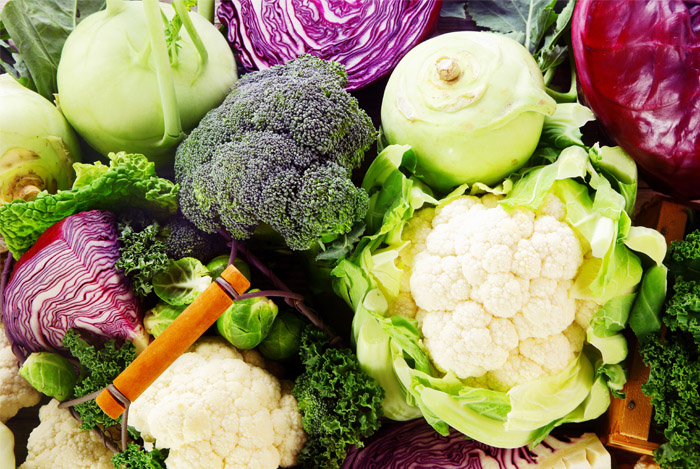
Conclusion
Broccoli is a low-calorie, low-sugar, highly nutritious vegetable that helps weight loss and fights cancer.
Broccoli contains a number of nutrients, including carbs, proteins, vitamin A, B group vitamins, vitamins C and E, beta-carotene, calcium, magnesium, phosphorus, iron, fiber, and cancer-fighting sulforaphane and indole-3-carbinol.
Since broccoli is low in calories and has a high amount of fiber, it is one of the few products that not only DOES NOT make you fat but also helps you lose weight.
As for its science-proven health benefits, broccoli prevents and treats various types of cancer, lowers cholesterol levels, improves eye health, treats gut disorders, detoxifies the body, prevents heart disease, boosts the immune system, promotes weight loss, and is highly recommended during pregnancy.
Broccoli is also recommended for children, men and women, and the elderly.
Broccoli is also safe for pregnant women.
Broccoli must be stored properly to take advantage of its health benefits, and it can be easily incorporated into your everyday diet with the tips and recipes provided above.
FDA Compliance
The information on this website has not been evaluated by the Food & Drug Administration or any other medical body. We do not aim to diagnose, treat, cure or prevent any illness or disease. Information is shared for educational purposes only. You must consult your doctor before acting on any content on this website, especially if you are pregnant, nursing, taking medication, or have a medical condition.
HOW WOULD YOU RATE THIS ARTICLE?
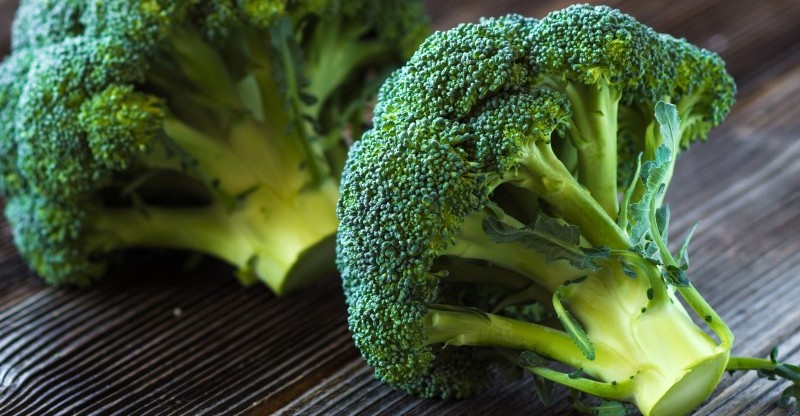


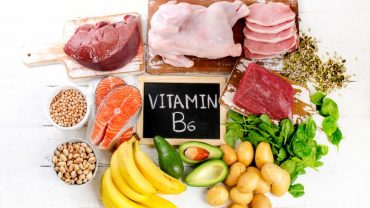



Starting eating broccoli was the best nutritional decision I’ve ever made. I’ve lost around 25 pounds and feel extremely energetic and healthy!
How much broccoli should a pregnant woman eat?
Can broccoli collagen boosting quality help me eliminate stretch marks?
Is it necessary to consume broccoli with oil to let vitamin A assimilate?
Good morning Helen. I have just stumbled on to your blog and was wondering how to get your most recent post?
The abundant nutrition innate makes the broccoli the nutrition power hose. Thanks for sharing information.